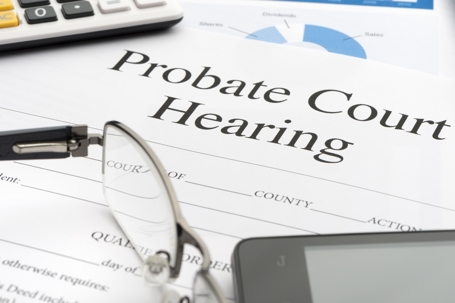There are many reasons to make an estate plan: to provide for loved ones, to make sure your last wishes are known and honored, and to minimize the tax burden on your estate. Another reason for estate planning is to avoid probate court.
Probate is the legal process of settling the estate of a deceased person (decedent). Depending on the size and complexity of the estate, there is usually some court oversight of the process. Probate can be time-consuming and stressful, especially while a family is grieving their loss. Probate filings are also a matter of public record, and families that value privacy often try to keep their business out of probate court.
While most people associate probate court with the administration of a decedent’s estate, the court may also be involved in the affairs of the living—often, when an adult is no longer able to manage their own finances or care, and a guardian and/or conservator needs to be appointed. As with probate after death, this lifetime probate can be costly and contentious, especially when there are disagreements about what is in the best interest of the alleged incapacitated person.
Planning ahead can help prevent the need for probate court involvement in your business both before and after your death. Let’s talk about how.
Does Having a Will Avoid Probate?
While estate planning is a critical part of staying out of probate court, not all types of estate planning will achieve that goal. A common misconception is that having a last will and testament means that your estate will not go through probate. That is simply not true: assets distributed through a will are considered probate assets, so if probate avoidance is your goal, you will need other estate planning tools in your tool kit. Fortunately, there are many options available, depending on your needs.
Estate Planning Options for Probate Avoidance
Some ways that you can avoid the need for probate involvement include:
Beneficiary Designations
Certain types of assets are designed to pass outside of probate through beneficiary designations. Brokerage accounts, retirement accounts like IRAs and 401(k)s, and bank accounts are common examples. As the owner of the account, you can name a beneficiary to whom ownership of the account passes automatically upon your death. You may have even made a beneficiary designation when you set up the account; some types of assets require you to name a beneficiary.
Joint Ownership of Assets with Right of Survivorship
You may also own an asset jointly with another person with rights of survivorship; when you die, the other person automatically becomes the owner of the asset. (This is different from a beneficiary designation because in joint ownership, the other person also has access to the asset during your lifetime; with a beneficiary designation, they do not.) Joint bank accounts are a common example of joint ownership, as is joint tenancy of a piece of real estate.
A word of caution: while joint ownership of an asset often includes survivorship rights, this is not always automatic. Check the language on the deed for property, or account ownership papers for financial accounts, to be sure that it specifically includes a right of survivorship for a surviving co-owner.
Ladybird Deeds (Enhanced Life Estate)
A ladybird deed, or an enhanced life estate deed, is another way to pass real estate outside of probate. Like a joint tenancy with right of survivorship (JTWROS), ownership of the property passes automatically upon an owner’s death. Unlike JTWROS, the remainder beneficiary has no rights to the property during their lifetime; the current owner has full control of the property while alive, including the right to sell or mortgage it, or even change the remainder beneficiary.
Ladybird deeds are available in only a few states; fortunately, Michigan is one of them. An enhanced life estate deed is available in Florida.
Trusts
The estate planning tools listed above all have advantages and disadvantages; one of the disadvantages is that they are limited to certain assets or types of assets. A trust is a legal arrangement that allows one person (the trustee) to hold and manage assets for the benefit of others (beneficiaries). Trusts can hold a wide range of assets, from real estate to bank accounts to personal property, and much more.
There are many different types of trusts designed to achieve various goals, but all of them avoid probate. Speak with your estate planning attorney to discuss which type(s) of trust may be right for your needs.
Durable Powers of Attorney and Advance Directives
The tools referenced above are primarily useful for avoiding probate after death (though if you have assets held in trust, your successor trustee can take over management of the trust if you become incapacitated). But what happens if you want to avoid the need for a guardian and/or conservator to make your personal and financial decisions?
To avoid the need for probate court during your lifetime, planning for incapacity is essential. Your incapacity planning should include durable powers of attorney and a patient advocate designation so that people you trust can make important personal, financial, and medical decisions for you without the need for the court to appoint a guardian or conservator.
Work with an Experienced Estate Planning Attorney
In general, avoiding probate when possible avoids expense, conflict, and delays in the administration of an estate or the care of an incapacitated person. That said, there may be circumstances in which probate is desirable. An experienced estate planning and probate attorney can help you decide what is right for you.
The knowledgeable attorneys at Barron, Rosenberg, Mayoras & Mayoras help families to plan for the future and navigate the probate process when necessary. Schedule a consultation today by calling (248) 213-9514 in Michigan or (941) 222-2199 in Florida to learn how we can assist you. You can also use our simple online contact form.
